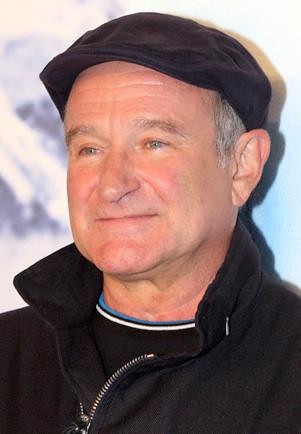We spend a lot of time and effort in our culture to encourage our kids to find their talents and hone them. This time of year, I’m beginning to piece together the after-school schedule, figuring out how I can get one child from point A to point B and pick up another child from school, all at around the same time every Wednesday afternoon. This task is a pain in the neck, but I do it because my children are all involved in activities that they love—music and 4H and acting. As I’ve written previously about the “myth of the overscheduled child,” our calendar isn’t packed with activities because any of us are concerned with the kids getting into top colleges so they can go to top graduate schools and earn a lot of money. My kids have chosen activities that they love and are good at, that bring them joy and fulfillment. And Daniel and I see enabling them to find and do what they love as a primary duty of parenthood.

Except that Robin Williams, dead from apparent suicide two days ago, clearly had found and was doing what he loved, exercising a brilliant gift and bringing laughter and hope to millions as a result. Phillip Seymour Hoffman, dead earlier this year from a drug overdose after more than 20 years sober, had also found and was doing what he loved, exercising his brilliant gift. Neither man was saved by discovering what they loved and working hard to craft a career doing it every day.
This makes me think that helping our kids discover and exercise their gifts is not nearly the most important thing we can do as parents. The most important thing we can do as parents is teach our kids to ask for help when they need it, and give help when others do. This can be a tough sell in our culture, where individualistic myths of the self-made person prevail, where poverty and educational deficits and depression and addiction are all widely perceived as failures of individual will, as the result of bad choices. While I have not seen this in my own church culture, I have read numerous accounts from people struggling with depression who say their fellow Christians told them that their illness was a spiritual matter, nothing that prayer and hard work and better choices couldn’t fix.
Jesus didn’t make love contingent on effort and good choices. Jesus said that God wants to find all who are lost, that he will leave behind entire flocks of people who are sticking with the plan, doing what they’re supposed to do, to go find the one who is lost. Jesus said that God welcomes back anyone who has strayed from the life of abundance he offers, even people whose own poor choices led them astray. (See Luke, chapter 15.) I think Jesus understood that what might look like a bad choice to us who don’t struggle with addiction or depression—taking the second and third and fourth drink, turning away from the voices of loved ones and doctors and therapists who say you’re going to be okay, it won’t always be this hard—aren’t really choices for someone whose brain is compromised by the diseases of addiction and depression. So our first duty isn’t to catalog other people’s mistakes, but to go after them when they are lost, to welcome them when they return.
The horrible thing (one of them anyway) about depression is that someone desperately in need of help might not ask for it, or the help that he receives might not be enough to save him. But on this side of heaven, asking for help when we need it, giving help when others do, is the best hope we have for saving the lives of people like Robin Williams and Phillip Seymour Hoffman and the millions of other lesser known people who struggle with addiction, depression, or both. Teaching our kids to ask for help when they need it, give help when someone else does, is the most important thing we can do, even if it’s not always quite enough.











